Why Hispanic Out of Home Advertising?
Targeting Hispanics with out-of-home (OOH) advertising is a smart strategy for four key reasons: Hispanics are a large and influential demographic group, their population is rapidly growing, they skew younger, and they are more likely to notice and engage with OOH ads.
- A large demographic group: Hispanics are the largest minority group in the U.S., making up a significant portion of the population. Currently, one in six U.S. residents is Hispanic, with 57 million Hispanics accounting for 17% of the total U.S. population of 323 million.
- A growing population: Hispanics have been the driving force behind U.S. population growth, accounting for half of the country’s growth since 2010. This trend underscores the increasing influence and buying power of the Hispanic community, making them an essential audience for advertisers.
- A younger demographic: The Hispanic population skews younger than the general population, with a median age significantly below the national average. This youthful demographic is highly active, tech-savvy, and culturally influential, making them more likely to engage with innovative OOH campaigns.
- Higher engagement with OOH ads: Research shows that Hispanics are more likely than other groups to notice and respond to OOH advertising. Their high levels of mobility, combined with an affinity for bold, creative visuals, make them a natural fit for OOH campaigns that catch attention and drive action.
By understanding the unique characteristics and behaviors of the Hispanic audience, advertisers can craft targeted OOH campaigns that resonate deeply with this influential and growing demographic group.
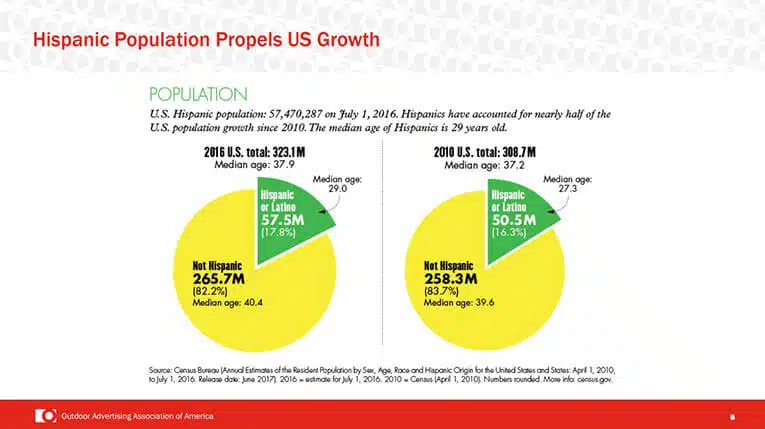
- A young population: Hispanics represent a significantly younger demographic compared to the overall U.S. population. The median age of Hispanics in the United States is just 29, compared to 40 for the non-Hispanic population. This younger audience is particularly valuable to advertisers because their brand preferences and purchasing habits are still being shaped. By targeting Hispanics with strategic advertising, businesses have the opportunity to build loyalty and long-term relationships with a dynamic and influential segment of the population.
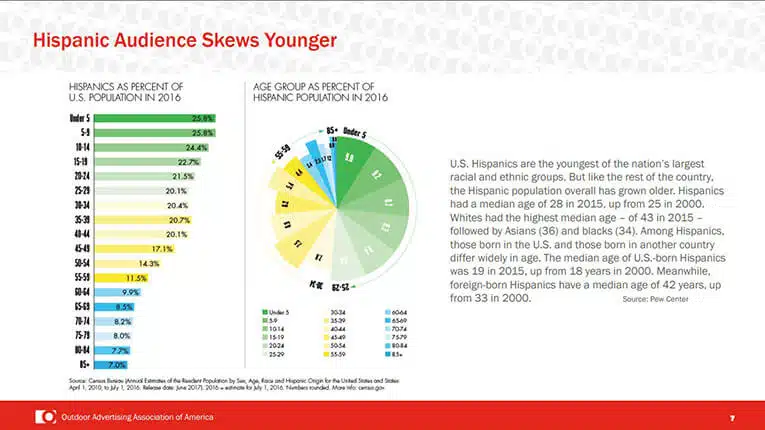
- A group that notices out-of-home advertising: Hispanics are significantly more likely to notice out-of-home (OOH) advertising compared to non-Hispanics. This is largely due to their younger demographic profile and higher reliance on public transit, where OOH ads are prominently displayed. The chart below highlights that Hispanics are 5–88% more likely to view OOH advertising than the average U.S. traveler, making this audience an excellent target for businesses looking to maximize their advertising impact.
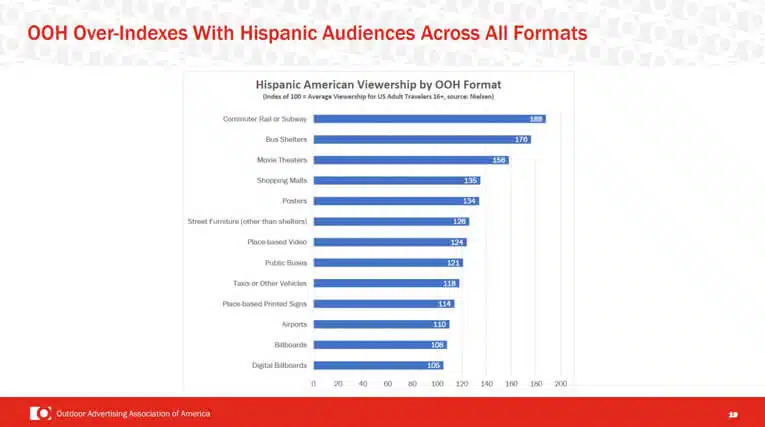
Where Should You Invest in Hispanic Out-of-Home Advertising?
It makes strategic sense to target Hispanics with out-of-home (OOH) advertising in areas with significant Hispanic populations. Over half of the Hispanic population resides in just three states: California, Texas, and Florida. These states not only house the largest Hispanic communities but also offer high visibility for OOH advertising campaigns, making them ideal for targeting this influential demographic.
To help advertisers focus their efforts, here’s a list of the 30 U.S. DMAs (Designated Market Areas) with the largest Hispanic populations. These regions represent prime opportunities to engage with Hispanic audiences through tailored, impactful OOH campaigns.
| DMA | State | 2014 Hispanic Population |
|---|---|---|
| Los Angeles-Long Beach-Anaheim | California | 6.0 million |
| New York-Newark-Jersey City | New York/New Jersey | 4.8 million |
| Miami-Fort Lauderdale | Florida | 2.5 million |
| Houston | Texas | 2.3 million |
| Riverside-San Bernardino | California | 2.2 million |
| Chicago-Naperville | Illinois | 2.0 million |
| Dallas-Fort Worth | Texas | 1.9 million |
| Phoenix-Mesa-Scottsdale | Arizona | 1.3 million |
| San Antonio-New Braunfels | Texas | 1.3 million |
| San Diego-Carlsbad | California | 1.1 million |
| San Francisco-Oakland | California | 1.0 million |
| Washington-Arlington-Alexandria | DC, Virginia, Maryland | 0.9 million |
| McAllen-Edinburg | Texas | 0.8 million |
| El Paso | Texas | 0.7 million |
| Orlando-Kissimmee-Stanford | Florida | 0.6 million |
| Denver-Aurora-Lakewood | Colorado | 0.6 million |
| Austin-Round Rock | Texas | 0.6 million |
| Las Vegas-Henderson | Nevada | 0.6 million |
| Atlanta-Sandy Springs | Georgia | 0.6 million |
| Philadelphia-Camden | Pennsylvania, New Jersey | 0.6 million |
| Tampa-St. Petersburg | Florida | 0.5 million |
| Fresno | California | 0.5 million |
| San Jose-Sunnyvale | California | 0.5 million |
| Boston-Cambridge-Newton | Massachusetts | 0.5 million |
| Sacramento | California | 0.5 million |
| Bakersfield | California | 0.4 million |
| Albuquerque | New Mexico | 0.4 million |
| Brownsville-Harlingen | Texas | 0.4 million |
| Tucson | Arizona | 0.4 million |
| Seattle-Tacoma-Bellevue | Washington | 0.4 million |
Source: 2024 U.S. Census.
By focusing on these areas, advertisers can maximize the impact of their campaigns and connect with one of the fastest-growing and most influential demographics in the United States.
Spanish or English?
When targeting the Hispanic demographic, Spanish-language advertising plays a critical role. While many Hispanics are bilingual or speak some English, only 41% report speaking English “very well,” according to a Pew Research study. This highlights the importance of connecting with this audience in their preferred language to maximize engagement and impact.
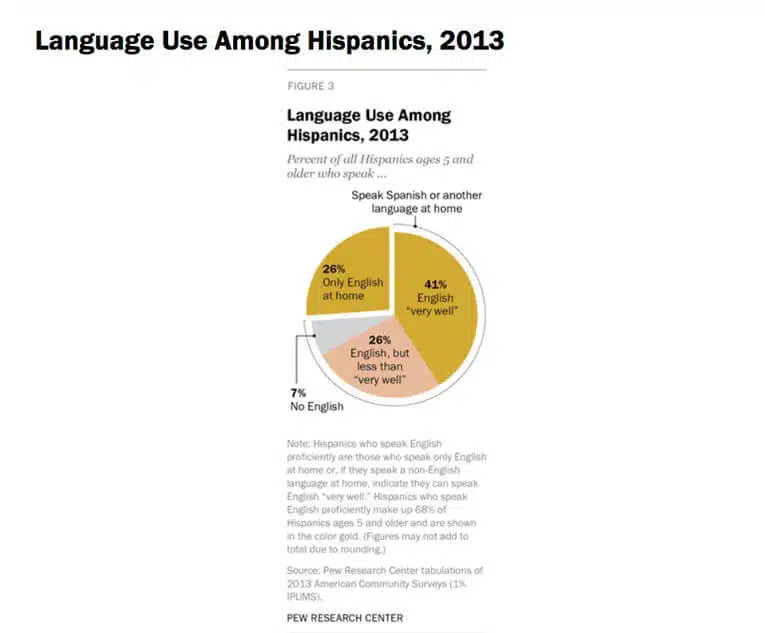
The research also shows that advertising in Spanish fosters respect and increases retention among Spanish-dominant Hispanics:
- Respect: 52% of Spanish-dominant Hispanics say hearing an ad in Spanish makes them feel that a company respects them and values their business.
- Retention: 53% of Spanish-dominant Hispanics are more likely to remember an ad if it is presented in Spanish, emphasizing the value of communicating in their native language.
Advertising in Spanish is more than a translation—it’s about building a connection. By addressing Hispanic audiences in their preferred language, brands can establish trust, show cultural awareness, and make a lasting impression.
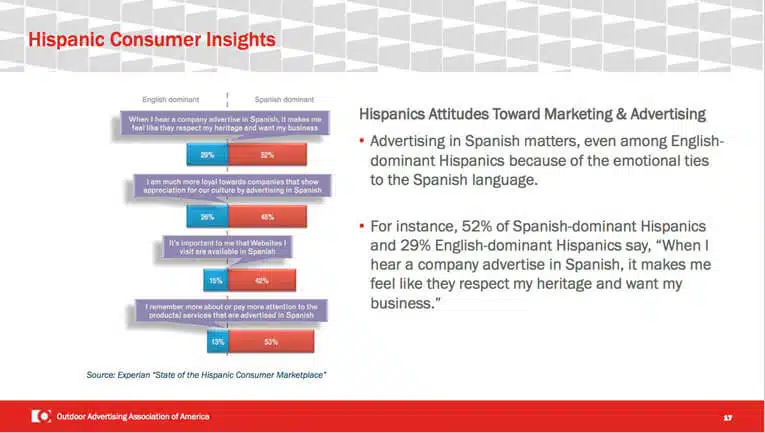
Source: OAAA, Marketing to Hispanic Consumers

